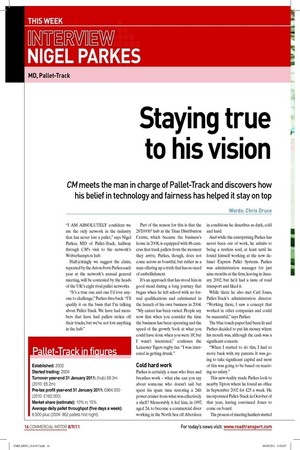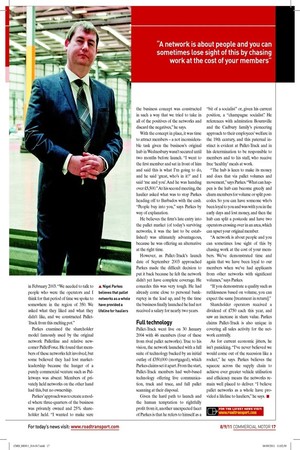Staying true to his vision
Page 12

Page 13

If you've noticed an error in this article please click here to report it so we can fix it.
CM meets the man in charge of Pallet-Track and discovers how his belief in technology and fairness has helped it stay on top Words: Chris Druce “I AM ABSOLUTELY conident we are the only network in the industry that has never lost a pallet,” says Nigel Parkes, MD of Pallet-Track, halfway through CM’s visit to the network’s Wolverhampton hub.
Half-jokingly we suggest the claim, repeated by the Aston-born Parkes each year at the network’s annual general meeting, will be contested by the heads of the UK’s eight rival pallet networks.
“It’s a true one and one I’d love anyone to challenge,” Parkes ires back. “I’ll qualify it on the basis that I’m talking about Pallet-Track. We have had members that have had pallets stolen off their trucks, but we’ve not lost anything in the hub.”
Part of the reason for this is that the 267,000ft2 hub at the Titan Distribution Centre, which became the business’s home in 2008, is equipped with 86 cameras that track pallets from the moment they arrive. Parkes, though, does not come across as boastful, but rather as a man offering up a truth that has no need of embellishment.
It’s an approach that has stood him in good stead during a long journey that began when he left school with no formal qualiications and culminated in the launch of his own business in 2004. “My career has been varied. People say now that when you consider the time the business has been operating and the speed of the growth ‘look at what you could have done when you were 18’, but I wasn’t interested,” confesses the Leicester Tigers rugby fan. “I was interested in getting drunk.”
Cold hard work
Parkes is certainly a man who lives and breathes work – what else can you say about someone who doesn’t sail but spent his spare time restoring a 24ft power cruiser from what was effectively a shell? Memorably it led him, in 1997, aged 24, to become a commercial diver working in the North Sea off Aberdeen in conditions he describes as dark, cold and hard.
And while the enterprising Parkes has never been out of work, he admits to being a restless soul, at least until he found himself working at the now defunct Express Pallet Systems. Parkes was administration manager for just nine months at the irm, leaving in January 2002, but he’d had a taste of road transport and liked it.
While there he also met Carl Jones, Pallet-Track’s administration director. “Working there, I saw a concept that worked in other companies and could be successful,” says Parkes.
The blue touch-paper had been lit and Parkes decided to put his money where his mouth was, although the cash was a signiicant concern.
“When I started to do this, I had to move back with my parents. It was going to take signiicant capital and most of this was going to be based on receiving no salary.” This new reality made Parkes look to nearby Tipton where he found an ofice in September 2002 for £25 a week. He incorporated Pallet-Track in October of that year, having convinced Jones to come on board.
The process of meeting hauliers started in February 2003. “We needed to talk to people who were the operators and I think for that period of time we spoke to somewhere in the region of 350. We asked what they liked and what they didn’t like, and we constructed PalletTrack from this melting pot.” Parkes examined the shareholder model famously used by the original network Palletline and relative newcomer PalletForce. He found that members of these networks felt involved, but some believed they had lost marketleadership because the hunger of a purely commercial venture such as Palletways was absent. Members of privately held networks on the other hand had this, but no ownership.
Parkes’ approach was to create a model where three-quarters of the business was privately owned and 25% shareholder held. “I wanted to make sure the business concept was constructed in such a way that we tried to take in all of the positives of the networks and discard the negatives,” he says.
With the concept in place, it was time to attract members – a not inconsiderable task given the business’s original hub in Wednesbury wasn’t secured until two months before launch. “I went to the irst member and sat in front of him and said this is what I’m going to do, and he said ‘great, who’s in it?’ and I said ‘me and you’. And he was handing over £5,500.” At his second meeting, the haulier asked what was to stop Parkes heading off to Barbados with the cash. “People buy into you,” says Parkes by way of explanation.
He believes the irm’s late entry into the pallet market (of today’s surviving networks, it was the last to be established) was ultimately advantageous, because he was offering an alternative at the right time.
However, as Pallet-Track’s launch date of September 2003 approached Parkes made the dificult decision to put it back because he felt the network didn’t yet have complete coverage. He concedes this was very tough. He had already come close to personal bankruptcy in the lead up, and by the time the business inally launched he had not received a salary for nearly two years.
Full technology
Pallet-Track went live on 30 January 2004 with 46 members (four of these from rival pallet networks). True to his vision, the network launched with a full suite of technology backed by an initial outlay of £350,000 (mortgaged), which Parkes claims set it apart. From the start, Pallet-Track members had web-based technology offering live communication, track and trace, and full pallet scanning at their disposal.
Given the hard path to launch and the human temptation to rightfully proit from it, another unexpected facet of Parkes is that he refers to himself as a “bit of a socialist” or, given his current position, a “champagne socialist”. He references with admiration Bournville and the Cadbury family’s pioneering approach to their employees’ welfare in the 19th century, and this paternal instinct is evident at Pallet-Track and in his determination to be responsible to members and to his staff, who receive free ‘healthy’ meals at work.
“The hub is keen to make its money and does that via pallet volumes and movement,” says Parkes. “What can happen is the hub can become greedy and churn members for volume or split postcodes. So you can have someone who’s been loyal to you and was with you in the early days and lost money, and then the hub can split a postcode and have two operators crossing over in an area, which can upset your original member.
“A network is about people and you can sometimes lose sight of this by chasing work at the cost of your members. We’ve demonstrated time and again that we have been loyal to our members when we’ve had applicants from other networks with signiicant volumes,” says Parkes.
“If you demonstrate a quality such as ruthlessness based on volume, you can expect the same [treatment in return].” Shareholder operators received a dividend of £750 each this year, and saw an increase in share value. Parkes claims Pallet-Track is also unique in covering all sales activity for the network centrally.
As for current economic jitters, he isn’t panicking. “I’ve never believed we would come out of the recession like a rocket,” he says. Parkes believes the squeeze across the supply chain to achieve ever greater vehicle utilisation and eficiency means the networks remain well placed to deliver. “I believe pallet networks as a whole have provided a lifeline to hauliers,” he says. n












































